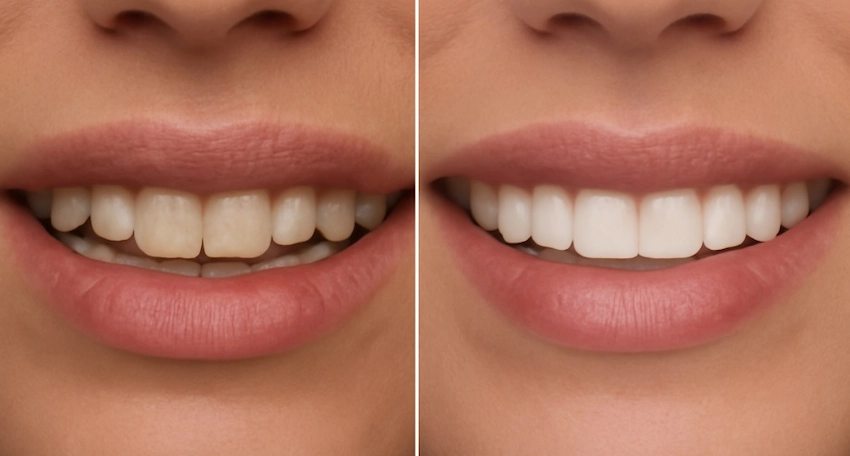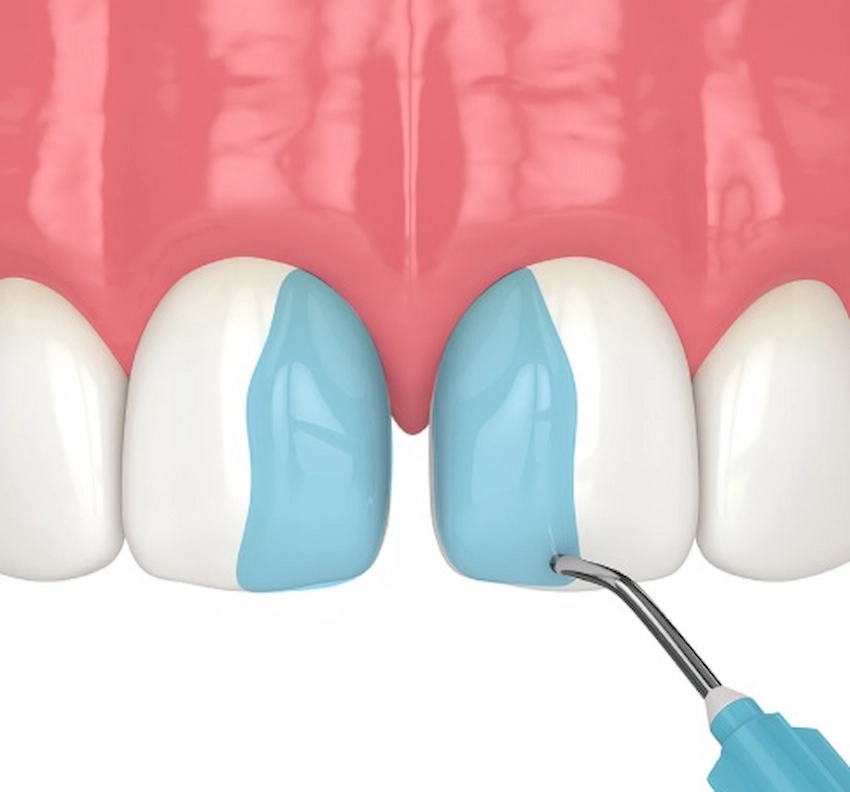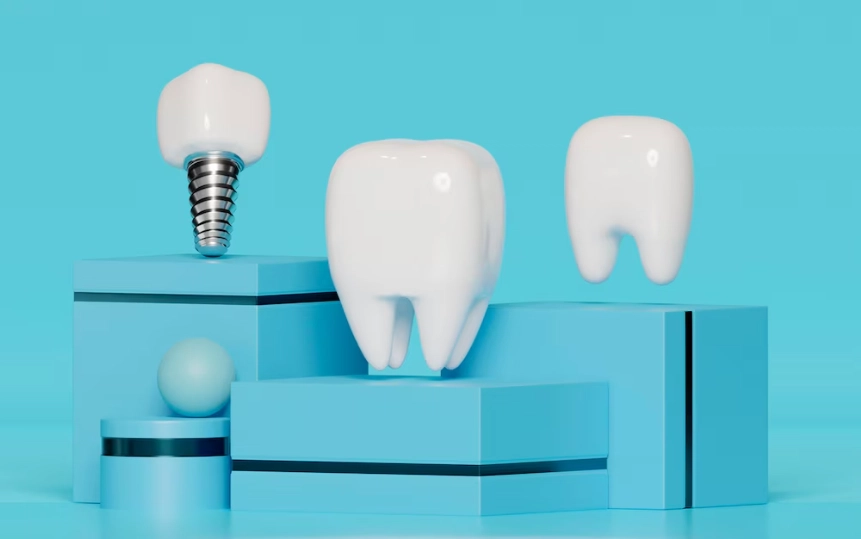🦷How Long Does Dental Bonding Last? Factors Affecting

Obtain the power of beautiful smiles with dental bonding. It’s a popular “tooth job” that can do, predictably fill in the gaps of teeth, provide dull teeth to be seen as bright, and maintain the original shape of the teeth. This art involves squishing and manipulating resin “material” in such a way that it reaches the natural ganglion of the patient’s teeth.
An exciting query regarding dental bonding – what is the length of time that these eye-catching resin fillings will remain effective? So, how long can Dental bonding last? There are so many factors affecting the long-term durability of Dental bonding – from lifestyle habits and dietary choices to the individual’s oral hygiene and the character of the bonding material..
Average Lifespan of Dental Bonding
Because it’s too dependent on some facets, the lifespan of inherent and dental bonding may be represented as an uncertain convention. If verified practically, the rate may range from three years to. Moreover, this determinant can refer to the bonding place and modes of lifestyle of the clients. The dental bonding, undergoing any kind of strain like the candies of the patients, hardly lasts as the dental bonding in the consequences the patients impose on them.
While you should not excessively munch on leftover food, if the bonding of the tooth is hardly visible, it is very sensitive to force and the bonding may not hold as long as lost. Regular dental visits might help maintain the bonding surface for a longer period. The bonding can be checked out at every dental outing, and the process can be assessed and dealt with as necessary to ensure that the bonding is still in place and functional.
Longevity Compared to Other Dental Procedures
In real life, though, the outlook is often not as rosy. In the case of dental bonding, however, the average lifetime of these bonding materials is typically lower than that of other cosmetic options like veneers or crowns. You would be able, by dental bonding, to get a lovely smile, contemporary and natural-looking, for as long as ten years, while other processes like veneers,if taken proper care of and taken seriously, might last appearance and utilization of essentially fifteen years or even longer. Meanwhile, crowns that are made to endure heavy workload and serious treatment may also profess to have even longer durability.
Despite that, dental bonding is not often deliberate as a permanent solution well on the contrary, it is usually not known which is better for oral health, its overall appearance, and other aspects. So to help you get the most reliable and certain advice connected to your specific needs, it is vital to mention particularly the different cosmetic dental techniques provided by your physician and compare their respective arguments. Rather than allowing judgment to be influenced by external stress or the arrestment of the teeth and mouth, the functions of the treatment plan should be considered: durability, finances needed, and the actual outcome you desire to attain.
Signs That Dental Bonding Needs Replacement
Despite oral health continuously progressing, an in-depth checkup during any appointment could identify signs before bonding becomes irreparable. Otherwise, if the lesion is present and direct, progress should be Bacillus. It may be a breaking area in dental bonding, the color that has changed and cannot be made clean, or the upper layer that feels zorro, and a sensation that bone in the administered tract.
Sensitivity in the operated tooth becomes apparent, which will tell you that it is a state of distress bonding. This could mean that the periodical dental repair has exceeded its useful life, and it should not be delayed. Regular dental visits will allow your dentist to monitor your dental bonding and identify problems that could lead to replacing or repairing the bond.
Factors That Affect How Long Happily Dental Bonding Lasts
Knowing the fact some factors influence its longevity, as well as how to take care of your dental bonding, may help you to make the most of its benefits. First of all, the factors discussed here represent the quality, kind, and characteristics of the bonding material; secondly, your oral hygiene methods and general habits significantly affect it; thirdly, the diet plan also plays a significant role since some foods can harm the composite used for the bonding.
Important habits, such as teeth grinding or clenching, lead to premature wearing down of this material if they are not correctly managed. Carrying out frequent and proper professional dental care and checkups is also important to check and repair any defect in the bonding that could lead to its disintegration over time.
Type Of Bonding Material Utilized
According to the kind of dental bonding material you use, its longevity may be greatly different. Different resins used in bonding have different qualities, and some of them are stronger and more resistant than others. Resins of higher quality have the chance of wearing and chipping, but when cared for correctly, they serve a person for a longer period of time as they are less prone to wear and tear.
Furthermore, the dentists are going to decide between different materials based on the nature of the dental work being done, the degree of damage, as well as the aesthetic values required. Therefore, when you go for a dental bonding consultation, ensure that you ask your dentist about the various available bonding materials that may be used on your teeth.
Oral Hygiene and Intended Care
The right oral hygiene practices and maintaining good dental bonding are paramount. Brushing and flossing on a constant, regular basis is to be taken care of very seriously to avoid forming a layer of plaque that could possibly imply some serious damage to the bonding as well as to the gums overall.
And also, when taking care of the bonded parts, avoid applying excessive force and maintain the same carefulness you give to your original teeth. Furthermore, use a toothpaste that is not abrasive for the smoothness and cleanliness of the bond. You are thus advised to build a routine that guarantees that your dental bonding receives the most appropriate care with the aim of enhancing the probabilities of its durability.
Food and Drink Patterns
Food preference and the type of beverages consumed also affect how long the dental bond is expected to last. To be careful while eating hard foods that could cause cracks and chips, you should give up on such foods as far as the restored teeth are concerned. On the same note, putting away any beverages that may lead to stains, such as coffee and red wine, may help to have longer-lasting white teeth. It is to be noted that you can easily damage the bonding through using teeth as tools, by biting stiff objects, and opening bottle caps. On the other hand, being responsible and cautious with what you eat and drink means that you are helping to maintain the bonding together with its good looks to ensure it serves you well for a long time.
Teeth Grinding and Clenching
Teeth grinding and clenching are detrimental behaviors that may bring about premature deterioration of dental bonding. The habit of involuntarily grinding your teeth or clenching your jaw will place extra strain on your teeth as well as uncertainly bonded areas, hence increasing the chances of breaking, cracking, or otherwise damaging your dental structure.
People who tend to grind their teeth, particularly at night, need to take this problem seriously. For people suffering from bruxism, one solution to consider is wearing a protective night guard as instructed by a dental specialist, as this one device can efficiently reduce the negative effects these actions have on the dental bonding and aid in the preservation of your beautiful smile.
Professional Dental Care and Checkups
To be able to maintain the dental bonding in the best condition as well as retain its natural beauty for as long as possible, professional dental care and regular checkups cannot be underrated. Dentists are well-trained, proficient individuals who not only know how to keep the dental bonding in check but also recognize the potential difficulties that may arise and initiate required actions before the issue becomes much more serious.
Furthermore, regular checkups with a dentist are the best way to keep up with the hygiene of dental bonding structures and areas because, in the course of checkups, this perfect specialist can perform effective cleaning operations for the bonded teeth structures, thus ensuring their immaculate and perfect performance. Every six months, by visiting the same qualified dentist, you can be sure of better health and maintenance of teeth, as well as the reasons for the bonding and the periods of their wear and tear.
Following these guidelines for the care and upkeep will not only maintain the excellent quality of your smile but will also make the bonded areas appear as new for years and years to come, offering you self-confidence and a sense of comfort that arises from having a gleaming, attractive grin.
How to Extend the Lifespan of Dental Bonding

Dental bonding is the process applied by dentists in covering your teeth effectively. Even though it is highly effective, there are various instances that dental bonding could get damaged and wear out over time. Nevertheless, there are straightforward and effective methods you can follow to try and extend the life of your dental bonding. First of all, it is necessary to have proper oral hygiene in your daily practice, and regular washing and flossing used cannot be over emphasized.
Secondly, you should be aware of the foods and drinks that you take and try as much as possible to avoid the hard and sticky ones that can cause damage or wear off the bonding. The other recommended way to make your dental bonding last a great deal is to wear protective appliances or devices when playing games and these along with the right attitude of correcting habits like grinding of teeth would give your dental bonding a longer durability and optimum use.
Proper Oral Hygiene Practices
Although dental boding is a process that needs a high level of attention and care, there is a proper oral hygiene practice that you should follow. For the daily oral health sake, an ideal frequency to brush your teeth is at least twice a day or after a meal. In a day, you should floss your teeth at least once to remove any particles likely to be stuck between your natural teeth and the bonding.
To help in the prevention of any gum diseases and tooth decay, you should use an antibacterial mouthwash or a dentist recommended rinse. You will notice that if you continue making these simple practices a part of your life, you will boost the life of the bonding on your teeth, and besides that, you will be promoting a healthy life as well.
Foods and Drinks to Avoid
If you want to ensure the long life of your dental bonding, you should be aware of which foods and drinks to avoid. The common ability to chip or crack your bonding may arise from chewing hard foods like ice, hard candies, and even nuts among others. Such types of foods can place an unreasonable amount of pressure on the bonding material and thus cause damages. Furthermore, sticky foods like caramel, toffee, and chewing gums can sometimes get stuck in the bonding.
These will not only damage your dental bonding but increase the chances of gum disease. Also in your consumption pattern, you can check on the staining of drinks like tea, coffee, and red wine. Some of these drinks make it hard for your bonding to appear fresh, and thus it won’t always look its finest. The possible damages that could be caused by these drinks and foods could make it difficult for your dental bonding to stay shiny and have a long life. The way you use and handle your food will keep your bonding intact; hence it is always good to observe your daily diet.
Protective Measures for Teeth Grinding
If you are interested in keeping your dental bonding safe for a long time, one of the ways to do that is to ensure the use of protective measures for teeth grinding. This can cause adverse effects on the condition of dental bonding as it may lead to excessive force in the mouth and as time lapses, this may contribute to the failure of bonding. The best solution to night grinding is the custom-made splints or night guards.
The night guard is placed on the upper teeth and this way they will be safe from the grinding pressure thus protecting their bonding. There are acceptable practices to employ to control the stress response as a present preventive technique for night grinding. To control the mind and produce peaceful and happy feelings, it is suitable and okay to engage in physical activities such as yoga and meditation. Dealing with your entire life, never forget that this range of practices is within your means, we may repay them to remedy the grinding but the thing is, to have a nice refreshing smile from that
Regular Dental Visits and Maintenance
If you have recently bonded teeth, then it’s essential to take care of these dentists’ bonding materials so that they may last longer and keep your general oral hygiene on top of the world. You need to visit your dentists if you want to have regular checkups and cleansing procedures at least every six months. During these periods, the dentists may get a chance to communicate with the bonded teeth and even touch up any potential areas that need fixing for proper care. Besides this profession, the dentist could also advise you on how to properly take care of these bonded teeth and offer necessary dental procedures that would make them even better suited for wearing for a long time without replacement.
How Long Does Dental Bonding Last and Longevity Factors
This article is going to be about the dental bonding process of teeth and educate you on this important area of dentistry and issues surrounding bonding. It will help you discover all that you would like to know including the dental bonding process how long it lasts, any possible discomfort and other factors that may affect its longevity.
You will also find some useful tips expansion or maximizing the service life of your bonded teeth plus so much more! to keep them healthy looking so that you do not have to spend extra money or time in taking care of them. Start reading this guide now and become an expert in dental care right away!
How Long Does Dental Bonding Last
When considering dental bonding, it is important for a patient to weigh the pros and cons of its durability against other dental procedures. The good news is that bonding materials are made specifically for wearing in our day-to-day lives. This makes them quite a tough nut to crack and a good choice for the everyday man.
On the other hand, it seems that bonding is not quite as long-lasting as other procedures such as crowns or veneers with some new findings showing that they could be designed for longer usage periods. Having taken these advantages and disadvantages into account assists in taking the right decisions in terms of your oral health.
Advantages of Dental Bonding
Dental bonding is a great alternative to other expensive options in dental care, and this could be one of the reasons for its popularity. One of the advantages of dental bonding is that compared to other dental interventions such as crowns and veneers, dental bonding is the most affordable. The bonding process is in fact quick, easy, and painless because it requires only minimal removal of the tooth structure while other methods may require bigger parts of the teeth to be removed. The materials used in bonding have been engineered using advanced technology to mimic the look of natural teeth such that the patient’s smile is improved without compromising appearance.
Limitations and Potential Issues
Dental bonding is not considered an option despite being somewhat of a contemporary measure in cosmetic dentistry. Additionally, the fact that it is not recommended for use in heavy-duty areas such as teeth grinding and biting leads to a limited application. If the problems concerning these limitations and their implications in the event of having dental bonding are correctly understood, it will be valid to consider all the available options that can improve the effect on self-image as well as oral health.
When to Consider Replacing or Repairing Dental Bonding?

It is extremely important to figure out the right time of whether to replace dental bonding in your mouth or repair it. The right decisions will not only affect your smile but also your self-esteem. The main things to be considered when replacing or treating dental bonding include, but are not limited to; the brought out damaged areas, severe rubbering up of the resin-based materials and your comfortability or non-discomfort at the bonded areas.
In a situation where the bonding appears a lot, and it does not resemble the natural teeth if there are no more bonding left, then the annoying results might be assuaged by redoing the bonding process. The regular monitoring of the teeth prepared for bonding with the access to react to fissuring, breaking, etc. of the bonded parts is some of the vital things community people always focus on sitting in a dentist’s
Common Reasons for Bonding Wear and Tear
Many factors can lead to dental bonding coming loose and being damaged. Natural aging of the adhesive, eating very hard or sticky foods and generally not keeping the mouth clean that may finally give a way of the bonding are some of the major factors. The societal stigma associated with dental negligence, sometimes whereby one is reluctant to go to see the dentist also causes damage.
The abrasive surfaces of the lower teeth when they rub against the surfaces of the front teeth can result in damage. teeth grinding or bruxism of the tooth could be the unknowing big thing that destroys dental bonding. You should concentrate more on all there is so that you can grace the durability of the dental bonding and extend the time that it takes before you have to seek re-placements. Besides following the dentist’s recommendation on the care of the teeth and the treatment to undergo, it is also advised to use protective measures such as a tooth guard.
Treatment Options for Worn or Damaged Bonding
Dental bonding will enjoy the natural wear and tear phase which will indeed be the majority of its life throughout which some refurbishing might be necessary due to the unavoidable process of degradation. In mild situations, the dentist who is in the business of repairing may still have the right to maybe just add in a new layer of some material in the affected spot on the bonding to enable it to continue service delivery.
Nonetheless, f this method does not work out after the prices of healing were not satisfactory and the bonding still proves ineffective then there is no other way than taking a drastic action of getting a completely new one replaced. To have a beautiful smile again and the dentist can give you a clear indication of the best method of treatment that is possible so that the bonding can be redone to look like new again.
Comparing Dental Bonding Longevity to Other Cosmetic Procedures
The long life of dental bonding is an essential factor to be put into thought once you identify that cosmetic dentistry is a must-have. While taking into account your wide range of choices in cosmetic dentistry, it is most important to estimate the durability of dental bonding in relation to the endurance of other cosmetic procedures that may interest you. However, any decorative work that is done to the teeth, for example, veneers, crowns, and other restoration materials even though more expensive, will have a lifespan longer than that of the composite material used for fillings, thus, the latter outweighs the former, as it should last up to five years
This piece of information, when under control, will certainly simplify the dental plan spell out the remaining expectations of every alternative that your dentist may suggest to you. Accurate knowledge about the procedure you are to undertake or the procedure which suits your dental plan shall enable you to come up with a proper decision. Moreover, it shall help you in being aesthetic, in the process of solving your dental issues, in creating financial sustainability, and will also improve your more accurate estimate of the time that you will find it necessary further services to more or worsening conditions.
Dental Veneers vs. Dental Bonding
Ordinarily, dental veneers last longer than dental bonding, therefore they are seen as a favorable remedy for people wishing for a permanent smile transformation. Bonding is generally considered to be a 10-year solution while veneers can serve for at least 15 years, probably even more, as they are made of stronger and better-maintained materials. The application of veneers, in contrast to bonding which is a one-time process, implies more dental visits and check-ups, thus, the treatment is usually more time-consuming which is at the same time more extended.
The cost of each type differs, with the manufacture of veneers being more sophisticated and requiring advanced materials, which usually results in a higher price compared to dental bonding. The ultimate decision between bonding and veneers depends on the financial capabilities available, the duration you want or imagine the correction to last and the look you want to achieve.
Dental Crowns vs. Dental Bonding
When one examines the durability of dental restoration, definitely, dental crowns as a whole outdo the somewhat partial dental bonding as the former engage the entire tooth and thus strengthen it throughout the tooth circumference and the same time, actually, from all around. Therefore, they are the most recommended choice for those teeth that have been destroyed. To explain more, bonding, apart from having a limited capacity to repair the tooth structure, so it can also be considered as a cosmetic improvement, it is of the opinion of most of the people who have resorted to small repairs, such as the removal of the enamel of the external surfaces by cracks, or the distortions of their teeth, that bonding absolutely does not suffice for such a process.
From the standpoint of durability, crown wins the race without any doubt as they last for the double period of time as bonded ones, apart from giving perfect protection to your teeth. A solution that caters to those patients who are looking for a permanent, strong and durable effect that can withstand all types of wear and last until they get old are the crowns. Like in any other dental case, the one who is in charge of the decision will be the dentist because he is the one who will determine if it is necessary or not, after studying the patient’s individual needs, the patient’s condition of the teeth, the budget of the patient, and the patient’s preferences.
Composite Fillings vs. Dental Bonding
Both composite fillings and dental bonding are two of the most common procedures that are done to improve the smiles of patients; however, it should be noted that the two procedures do not have the same purposes and are each used for something different. Generally, the purpose of using composite fillings is to restore the teeth that have been damaged by decay; thus the filling is used to fill these holes and at the same time, maintain the original tooth structure whereas the latter is a cosmetic treatment to make teeth look better the fact that they are not necessarily damaged.
Fillings are generally more durable than dental bonding if the former is properly placed as they demonstrate high resistance to pressure from chewing and much crack. In addition, they will be the same color as the tooth remaining once they are completely set; on the downside, however, they are also mini-time bombs as the next time the cavity is hit the tooth race is visible by the human eyes.
Dental Bonding FAQ: Everything You Need to Know About Restoring Your Smile
Dental bonding is a widely used dental restoration method that is applied to repair teeth that are chipped, cracked, or discolored. Here-it is at the point of the damage that a tooth-colored resin is joined for the tooth’s appearance to be Here, restored. If, for instance, you consider dental bonding as the best option, this FAQ section will address the most frequently asked questions about this treatment, including its features, advantages, and recovery process.
Dental bonding is often used to fix minor imperfections such as gaps, chipped teeth, or discoloration. It’s also an option for improving the appearance of uneven teeth or reshaping teeth that are too small.
Dental bonding is a minimally invasive procedure and typically doesn’t require anesthesia. Most patients experience little to no discomfort during the process, though some may feel slight sensitivity afterward.
With proper care, dental bonding can last anywhere from 5 to 10 years. However, the material may wear down over time or become stained if proper oral hygiene isn’t maintained.
The process typically takes 30 to 60 minutes per tooth. The dentist will clean the affected tooth, apply a resin material that matches the color of your teeth, shape it to fit, and then harden it with a special light.
Yes, dental bonding uses a tooth-colored resin that blends seamlessly with the natural color of your teeth. It’s an effective way to enhance your smile while maintaining a natural appearance.
Yes, dental bonding can be used for small fillings in cavities, especially on the front teeth. The resin can restore the shape and function of the tooth while blending with the surrounding enamel.
After dental bonding, it’s important to avoid hard foods, smoking, or excessive consumption of stain-causing substances like coffee. Regular brushing and flossing are essential to keep the bonded teeth clean and healthy.
Dental bonding may be covered by insurance if it’s used for restorative purposes, such as filling cavities. However, cosmetic bonding for aesthetic purposes may not be covered, so it’s best to check with your insurance provider.
The cost of dental bonding can range from $100 to $400 per tooth, depending on the complexity of the procedure and your location. While it’s less expensive than other cosmetic procedures like veneers, the price can vary based on individual needs.
Yes, dental bonding is an excellent option for treating imperfections on the front teeth, such as chips, gaps, or discoloration. The tooth-colored resin blends seamlessly with natural teeth, providing a beautiful, natural-looking smile.




